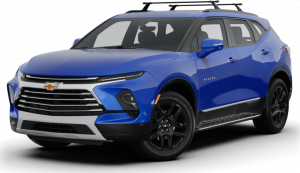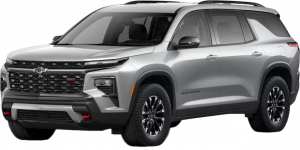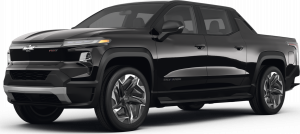The Cost of Owning a Chevrolet Electric Car in Redlands

When we think of the city of Redlands, the vast orange groves, the Redlands Bowl, and its historic downtown come to mind. But there's a shift happening on the streets of this city - electric vehicles (EVs) are becoming a common sight. And as the transition to electric mobility accelerates, Redlands residents are weighing the costs of making the switch. Enter Guaranty Chevrolet – not just a name synonymous with trust but also a forerunner in educating customers about the real expenses behind EV ownership. Let's dive into the costs of owning an electric car, tailor-made for Redlands readers.
Initial Purchase Price
Historically, electric cars came with a heftier price tag compared to their gasoline counterparts. However, technology improvements and increased production have steadily reduced EV prices. Plus, when you shop at Guaranty Chevrolet, you're sure to find competitive pricing and enticing deals, making the switch to electric more affordable.
Government Incentives
To promote cleaner transportation, both federal and state governments offer incentives for electric car buyers. These incentives, in the form of tax credits or rebates, can significantly lower the effective cost of your EV. As a Redlands resident, you can take advantage of California's Clean Vehicle Rebate Project (CVRP), which offers rebates for the purchase or lease of qualified vehicles.
You may qualify for a credit up to $7,500 under Internal Revenue Code Section 30D if you buy a new, qualified plug-in EV or fuel cell electric vehicle (FCV). The Inflation Reduction Act of 2022 changed the rules for this credit for vehicles purchased from 2023 to 2032.
The charging aspect
Electricity is generally cheaper than gasoline, especially when you charge at home. Redlands residents enjoy electricity rates that are competitive, and many opt for solar panels, further reducing their charging costs. However, it's essential to factor in the price of installing a home charging station, which can vary based on its capacity and features.
On the flip side, public charging, especially fast charging, can be more expensive. But with planning and apps to guide you to the most affordable charging points, you can manage these expenses effectively.
Charging capacity and Useful Terms
| Term | Description |
|---|---|
| Kilowatt (kW) | Think of this as the electric version of horsepower. It tells you how strong an electric motor is, the peak speed of an EV charger, or even the power your house uses. For perspective, a standard electric kettle utilizes about one kW, while certain hot tubs could need up to 10 kW. Top-tier charging stations currently hit 350 kW, but there are emerging ones reaching 500 kW. |
| Kilowatt-hour (kWH) | This is all about energy over a specific duration. It can tell you the energy storage capacity of an EV battery, energy delivered by a charger, or your home's monthly energy consumption. To give you an idea, the typical American household consumes nearly 900 kWh of electricity each month. |
| Watt-hours per mile (Wh/mi) | This is an efficiency metric for EVs. Similar to how we measure fuel efficiency in traditional vehicles with gallons per mile – the lower this number, the better. For instance, the Tesla Model 3 Long Range has an efficiency of 260 Wh/mi, as per official EPA data. |
| Miles per kWh (mi/kWh) | Another efficiency measurement but in reverse. It's similar to miles per gallon (mpg) – the higher the number, the better. The Tesla Model 3 Long Range, according to the EPA, achieves 3.8 mi/kWh. |
| Miles per gallon equivalent (MPGe) | This unit offers a comparison between EV efficiency and traditional fuel vehicles. It indicates the distance an EV can cover using energy equivalent to one gallon of gasoline. As an example, a Model 3 Long Range has an EPA-rated 131 MPGe, while the 2023 Toyota Prius Prime achieves up to 127 MPGe on battery but drops to 53 miles per actual gallon when it switches to gasoline. |
| Level 1 (L1) charging | This is basic charging using a regular 120-volt outlet. The vehicle's internal system converts the alternating current (AC) from the outlet to the direct current (DC) the battery needs. Offering around 1.5 kW, it can take anywhere from a day to an entire week to fully charge an EV. |
| Level 2 (L2) charging | A more potent charging method using a 208–240V connection. Again, the vehicle converts the AC to DC. Commonly found in homes, these chargers, offering between 7 kW and 19 kW, can fully charge an EV in four to 30 hours. |
| DCFC | A potent charging method that supplies the battery directly with DC at much higher power levels, bypassing the need for conversion. Their power can range from 50 to 350 kW, and they can fully charge an EV within 30 minutes to three hours. |
| Time of Use (ToU) | This billing system charges you based on when you use electricity. Generally, peak hours, like 5:00 p.m. to 10:00 p.m., are pricier, while off-peak hours, such as midnight to 6:00 a.m., are cheaper. |
| Baseline Allowance | Another billing method where there's a fixed, lower rate up to a specific kWh limit each month. Exceed this limit, and you'll be charged at a higher rate. |
Maintenance Savings
When we talk about owning vehicles, we often focus on the upfront cost, but ongoing maintenance plays a crucial role in the total ownership experience. Electric vehicles (EVs), with their revolutionary design and function, offer significant maintenance advantages over traditional gasoline vehicles. Let’s delve deeper into these benefits, particularly for those in Redlands considering making the switch with the guidance of Guaranty Chevrolet.
Simplicity in Design
At the core of the EV's maintenance advantage is its simplicity. Electric motors are inherently less complicated than their internal combustion counterparts. With fewer moving parts, there's less that can go wrong. Traditional engines have over 2,000 moving parts, whereas electric motors can have fewer than 20. This reduced complexity translates directly to fewer points of failure and, consequently, fewer trips to the service bay.
Goodbye to Oil Changes
Arguably one of the most frequent maintenance tasks for gasoline vehicles is the oil change. Engine oil lubricates, cools, and cleans the engine, preventing it from seizing or getting damaged. However, electric motors don’t require oil to function. This means EV owners can bid farewell to regular oil changes, saving both time and money over the lifespan of the car.
Regenerative Braking: A Game-Changer
Traditional vehicles rely solely on brake pads and discs to slow the car down, leading to wear and tear that necessitates periodic replacements. In contrast, many electric cars utilize regenerative braking, which recovers the energy typically lost during braking and converts it back into power for the battery. Not only does this enhance the car's efficiency, but it also reduces the wear on the brake pads and discs, prolonging their life and reducing the frequency of replacements.
Fewer Fluids to Replace
In addition to oil, gasoline cars require various other fluids, like transmission fluid, coolant, and brake fluid. While EVs still use some of these (like coolant for the battery and brake fluid), the absence of a transmission and reduced brake wear means fewer fluid changes overall.
Reduced Exhaust System Issues
Gasoline cars come equipped with exhaust systems prone to rust, corrosion, and potential damage. Electric vehicles don't produce exhaust emissions, so they don't need this system, eliminating another potential maintenance headache.
Battery Replacement
While EV batteries are designed to last long, they will degrade over time. Depending on usage and care, most EV batteries can last over a decade before needing replacement. Fortunately, the cost of batteries has been dropping, making replacements more affordable. Plus, many manufacturers, including those represented at Guaranty Chevrolet, offer long-term battery warranties, cushioning owners from potential replacement costs.
Initially, EVs faced steep depreciation. However, as the technology has become more mainstream and trusted, resale values are improving. Cars with longer-range batteries tend to hold their value better. Additionally, the commitment of establishments like Guaranty Chevrolet to support and promote electric cars instills confidence in potential second-hand EV buyers in Redlands.
Environmental & Intangible Benefits
While not directly a 'cost,' it's worth noting the environmental benefits of owning an EV. With zero tailpipe emissions, EVs contribute significantly less to air pollution. For a city like Redlands, known for its beautiful outdoor spaces and commitment to sustainability, driving an EV aligns with the community's ethos.
Moreover, the intangible benefits – like driving silently, the pleasure of instant torque, and the satisfaction of being eco-conscious – while hard to put a price on, certainly add value to the EV ownership experience.
Final Thoughts
Transitioning towards greener alternatives is becoming increasingly common, and for the residents of Redlands, the journey towards a sustainable future is best represented by the rising popularity of electric vehicles (EVs). When contemplating the switch to electric, understanding the options available and the evolving landscape of electric mobility is crucial.
Guaranty Chevrolet provides the necessary guidance and introduces some of the Best Chevrolet Electric Cars for Families in Redlands, ensuring a smooth transition for the locals. As affordability and access to charging infrastructure improve, the adoption of EVs is becoming a financially savvy decision. Residents can conveniently keep their EVs powered up by Charging Your Chevrolet Electric Car in Redlands, which is a straightforward process aided by a growing network of charging stations. Additionally, the Future of Chevrolet Electric Vehicles showcases a promising trajectory towards enhanced performance, longer ranges, and better integration with modern lifestyles. Hence, as the Redlands community progressively adapts to the electric revolution, the synergy between Chevrolet's EV offerings and the city's commitment to a sustainable future exemplifies a shared goal towards environmental responsibility.
As Redlands continues its journey towards a greener future, electric cars are poised to play a central role. The costs of owning an EV have never been more favorable, especially when you have trusted partners like Guaranty Chevrolet guiding you through your ownership journey. From purchase price to maintenance and charging, the evolving landscape of electric mobility promises a future where the choice to go electric isn't just an environmentally conscious decision, but a financially savvy one as well. Whether you're cruising down the tree-lined streets of Redlands or exploring beyond, an electric vehicle is an investment in a cleaner, more sustainable future.


















